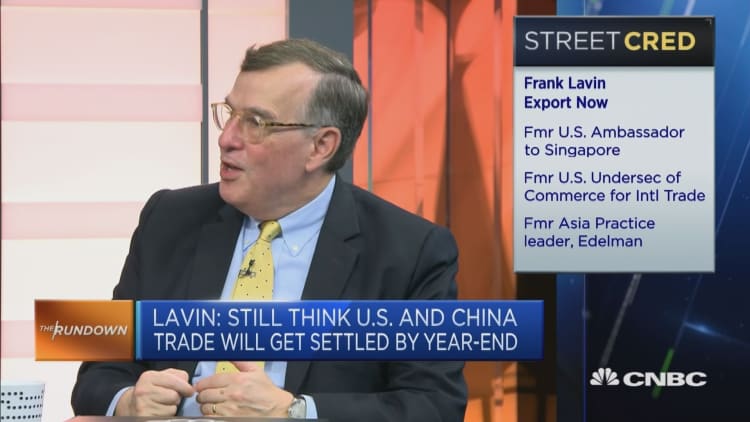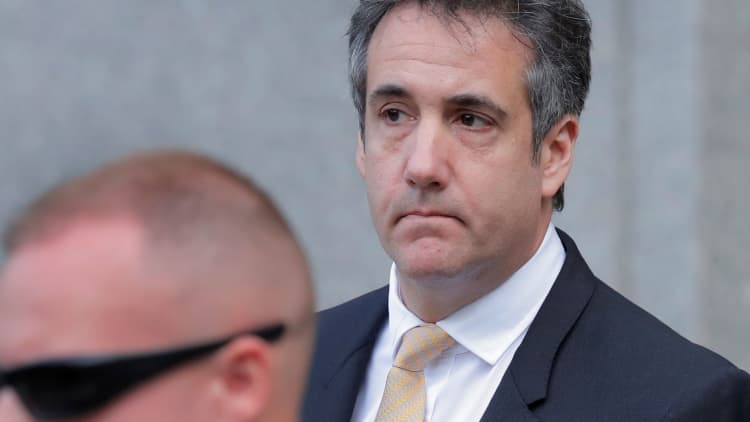Besieged by increasing legal concerns, U.S. President Donald Trump is thought to be looking to shore up his political position ahead of the midterm elections in November.
One way to do so could be to distract voters from the problems at home by shifting the focus to the ongoing trade war with China, analysts said. In other words, the U.S. may be on the verge of escalating the conflict between the world's two largest economies.
Last Tuesday, Trump was hit by two legal bombshells simultaneously: One involved his former campaign chairman, Paul Manafort, who was found guilty of eight felonies, and the other his former lawyer Michael Cohen, who pleaded guilty to eight felony counts involving various fraud.
Potentially the most damaging piece of news for Trump was Cohen implicating the president in an illegal scheme to silence two women from making public their claims of having sex with him.
The two cases have fueled talk — even from the president himself — about impeachment.
"The point is that with the political pressures at home, Trump needs to up his political capital (buffer)," said Vishnu Varathan, Mizuho Bank's head of economics and strategy.
The White House could drum up support by focusing attentions on a "common enemy," but that could anger businesses suffering from tariffs, Varathan said.
"On China, he will be caught between using 'distract and consolidate' by turning up trade pressures, and not squandering his political capital given that businesses are not in favour of an intensifying trade dispute. It is a tough call and may include incremental shifts either way," he told CNBC in an email.
Nick Marro, an analyst at the Economist Intelligence Unit, echoed those sentiments, explaining that Trump has demonstrated a pattern of turning to geopolitics as a domestic ploy.
"There is a chance that the president could use the trade war as a diversion: We've seen him do it before with international affairs," Marro said.
But that's a "big risk" if there's any chance that the dispute could be deescalated, he told CNBC.
"The greatest value from the talks (recently) was that both sides returned to the negotiating table, perhaps creating a path forward for more substantive discussions. But that small momentum would be eliminated if Trump uses the trade war as a political diversion."
Shane Oliver, AMP Capital's head of investment strategy, said the U.S. legal developments so far aren't severe enough to lead to Trump being removed from office, but it runs the risk of the president "doing even less considered things" to shore up his base. For markets, that could mean more volatility that could intensify in the months ahead, according to Oliver.
However, former U.S. Under Secretary of Commerce for International Trade Frank Lavin told CNBC's Dan Murphy that the "odds are overwhelming" that the Democrats will win the House in the midterms. That could spell bad news for Trump.
"If the House goes Democratic, they now have investigative powers, they can summon witnesses ... they can have hearings," Lavin, who served in multiple Republican administrations, said. However he qualified that for any real damage to Trump's political future, there has to be real "fire below the smoke ... some kind of crime or activity that rises above the level of the felony."
There wasn't consensus, however, that Trump's domestic headaches would have any impact on where the U.S.-China trade war is heading.
For one, Milken Institute Asia Fellow Curis Chin said the trade tensions are set to worsen regardless of what's troubling Trump. Instead, the president is simply keeping to his initial campaign promise: "fair trade" through "a tougher stance on the trade relationship with China," said Chin, who was formerly U.S. ambassador to the Asian Development Bank.
"Trump has tapped into an ongoing unease in the United States, and indeed across Asia, about Chinese trade practices. The violation of intellectual property rights, and unfair or unequal treatment of foreign companies in favor of domestic players in China is a challenge faced by American and non-American companies alike," he said.
Despite that, a NBC News/Marist poll released last week found that Trump's tariff policy has failed to catch on in three states critical to the midterm elections — Pennsylvania, Texas and Illinois. Many voters in those states said that the duties will raise the cost of consumer goods and hurt the U.S. economy.

But, according to Lavin, a longer-term is that China has been sent a signal that the U.S. is not a reliable trading partner. In turn, Beijing may turn even more of its business to other countries.
"This will take several years to come to maturity, but the United States has lit a fire that might not end up in the interest of the United States. So there's a long-term cost," he told CNBC.
U.S. midterm elections will be held on Nov. 6 this year.
WATCH: Coverage of Trump's very bad afternoon

—CNBC's Jacob Pramuk and Tucker Higgins contributed to this report.


